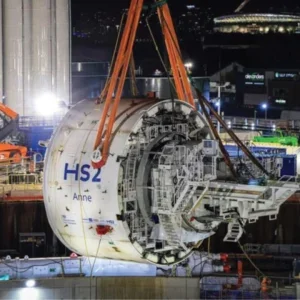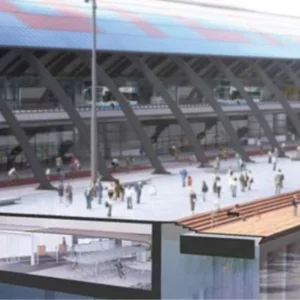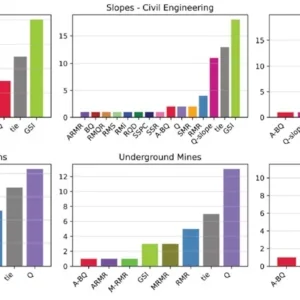Opposing the motion, Dave Hindle said the mining industry uses self-certification with a workforce on bonus and has an accident record per kilometre of tunnel that is insignificant. He saw the Heathrow collapse as not a result of a failure of self-certification but of the lowest bid syndrome. The North Downs Tunnel proved that self-certification works.
Jack Knight, a supporter of the motion said what is needed is a good pit boss and a good inspector. Taking half of this team away and putting inspection into hands of young people buried under a mound of paper is a recipe for disaster.
Mike O’Connell was against the motion. The tunnelling industry needed to get it right first time, he said. The way to do this was to give ownership to the people doing the task, and train them to be competent.
Ray Bulkhead declared that self-certification was the son of Quality Assurance and was used by NASA not to achieve quality but traceability. Quality Assurance is good for manufacturing products as it allows defective batch numbers to be traced and products to be removed.
He blamed the poor wages paid by the industry for the lack of engineers to undertake site supervision.
Adversarial conditions did not exist under ICE 5th, Bulkhead said, because clients paid the Consultant and allowed him sufficient time to prepare thorough designs and clear documents which enabled the Contractor to know what he had to do.
Dave Fawcette spoke for the motion. He said the main problem with self-certification was that it involved too much regulation and procedure, which muddied the waters in terms of responsibilities. He called for a return to the role of the Engineer.
Dave Court, speaking against the motion, said the ICE and the profession needs to consider how to give more responsibility to young people and enrich their work. With self-certification it is crucial to ensure the people are competent to undertake the work and that safety critical work is not entrusted to a fresh graduate without the required experience and competence. Self-certification makes people responsible and empowers people.
Court said that on the Medway immersed tube Nuttall‘s had quantified NCRs in terms of cost and programme to make people realise the cost of replacing defective work. Additionally, all were encouraged to raise NCRs, as management needed to know where the problems were to plan them out.
Peter Shuttleworth was against the motion. He believed that good materials combined with good workmanship produce quality tunnels. In the 1970s, he noted, the Resident Engineer’s Materials Engineer would receive a list from the Contractor of the proposed materials, which tended to be the lowest cost. The RE would take a month to inspect the sources and review the information before approval. Shuttleworth said that on the CTRL it is refreshing to receive self-certified proposals that the Contractor has approved, certified and checked and issued to the project manager for acceptance. Self-certification starts with the selection of materials and with the Contractor providing the documentation and the assurance that he will perform.
Tom Branton disagreed with the motion, arguing that the tunnelling industry needs to change and learn to give the Client better value. This does not rely on inspection but comes from empowering and training individuals to know what is important and what quality standards are required. The CTRL shows how this can be achieved through partnering and risk management with self-certification.
Bill Grose spoke in favour of the motion. He accepted that on the North Downs Tunnel self-certification had been a success. However, there had also been some spectacular failures. He noted that many speakers in the debate had said that using self-certification one could employ independent inspectors and that checks and balances are what make it work. Grose added that it appears that self-certification is like driving a car – dangerous in the wrong hands. Self-certification may be the future, but it is dangerous.
Colin McKenzie backed the motion, saying it was unrealistic to apply self-certification across the whole industry and that it would be dangerous in some circumstances.
Julian Beeble sided with the motion. He worried that a significant number of clients select the lowest tender and warned this may be dangerous when combined with self-certification.
Duncan Southcote of Alliance Insurance was confused about what constituted self-certification. Noting that on the North Downs tunnel the RLE had a key role in the acceptance of critical method statements and process documents, he asked if the same system had been applied at Heathrow, would the collapse have occurred?
Kevin McManus, in backing the motion, warned that nothing works if it is intrinsically dangerous. He saw self-certification as the son of Quality Assurance to give traceability for self-checking. He argued that we may save on the Engineer and the Inspector, but if they are replaced by legions of Quality Assurance personnel, auditors and the like that outnumber those they replace what have we gained?
David Parkinson spoke against the motion. He stated he was a member of the institution of Clerk of Works and worked for Andy Sindle. He argued that his very presence demonstrated that inspectors had not disappeared with self-certification.
Terry Mellors spoke for the motion as he was not convinced by the notion that self-certification would get it right first time when it had failed to do so in the past.
Barry New upheld the motion. He considered the human aspect a critical factor. Self-certification sounded a good idea in principle, he said, but so did communism. In practice it was not possible to be a poacher and a gamekeeper at the same time.






